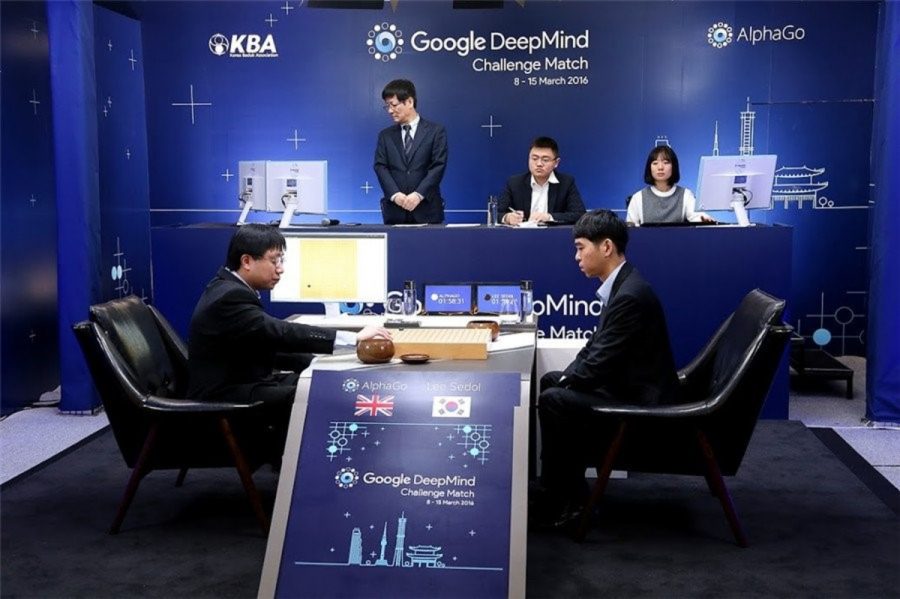By Adam Peng ’17, Sports Editor
On March 15th, in a match that attracted millions of Go-lovers around the world to Seoul, South Korea, AlphaGo versus Lee Sedol, came to an end after an intense week long competition. AlphaGo, developed by Google DeepMind, beat the professional Go player from South Korea, Lee Sedol, who represented humankind. The final score was AlphaGo 4 Lee Sedol 1. After the match, AlphaGo was recognized as an “honorary 9 dan” by the Korea Baduk Association and received a world ranking of number 4 alongside all the other professional Go players.
Invented in East Asia over 2500 years ago, without anyone knowing who invented it, Go is known as the most complicated chess game and the highest representation of human intelligence in history. Played on a 19 by 19 square board, possibilities in each game are unimaginable and have been fascinating people from all backgrounds for thousands of years.
Before the match started, AlphaGo received many doubts and questions from both amateur-ish and professional Go players. Much of the attention focused on how AlphaGo differs from other computer Go programs and the chance for computer programs to make implausible human choices. Gu Li 9 dan, a legendary Go player from China, who has been an old rival of Lee Sedol throughout his career predicted that AlphaGo barely had a chance to win even one game before the match started.
However, AlphaGo proved strong from the start, showing its incredible ability to calculate different choices late in the game. Despite Lee Sedol’s dominant pace early, AlphaGo’s perfect performance later in the game regarding its deliberateness of details forced Lee Sedol to make some mistakes.
Interestingly, in game 2 and 3, AlphaGo made unexpected moves more frequently. According to computer experts like Zheng Yu, it makes these decisions because AlphaGo’s goal is to win the game, instead of winning decently. When the probability of winning is high enough in an area, AlphaGo will change its perspective and look for new opportunities for greater advantage, which is a feature that can rarely be seen by human chess players.
In fact, AlphaGo’s algorithm uses not only Monte Carlo Tree Search (MCTS), which helps it to find the solution in an area with best chance to win, but also develops a deep learning method which allows it to memorize strategies from millions of modern Go games. In addition, AlphaGo can play against itself in order to improve its technique.
For example, in game 3, AlphaGo and Lee Sedol had a drastic “fight” on the corner of AlphaGo’s side. Lee Sedol, although famous for his zombie like dogfights in small areas in professional games, did not make any progress when fighting with AlphaGo, which finally led him to lose the third game.
After three disappointing losses, the Go community felt a heavy atmosphere of despair, feeling AlphaGo was too flawless for human beings to beat. Some players like Ke Jie 9 dan, who is the current world ranking No. 1 player claimed Lee Sedol was not good enough to represent humans. Indeed, the victory of Lee Sedol in game 4 was a big surprise for professional Go players. After over 15 minutes of pondering, on the 78th move, AlphaGo made a totally unexpected play and crushed his chances for the 4th game. seemed totally unexpected by AlphaGo and the game simply crushed for AlphaGo after the move.
Thus, this game along with its 78th move became an instant classic. the 4th game also showed how remarkable human intelligence is, even in the face of artificial intelligence. It is also a reminder for computer programmers that there is much more work to be done for further use of artificial intelligence in the future.
After game 4, Lee Sedol, surrounded by cameras, said, “I feel flattered, it was only one game and I don’t think I really deserve so much attention. It was a great game, but without AlphaGo, I would not be able to show my best self, either.”
It is a victory, for both the development of technology and those who love human intelligence. There is no doubt that one day, computers will beat humans in every game we are playing. After all, we are only human. However, there are many human qualities that can’t be learned: perseverance, romance, and the kindness of human nature. All we can do is wish. All we can do is to wish technology will bring us a better future with less pain and separation.
Sources:
https://en.wikipedia.org/wiki/AlphaGo
http://it.sohu.com/20160313/n440247478.shtml
Image Source: https://gogameguru.com/i/2016/03/AlphaGo-Lee-Sedol-Aja-Huang.jpg




